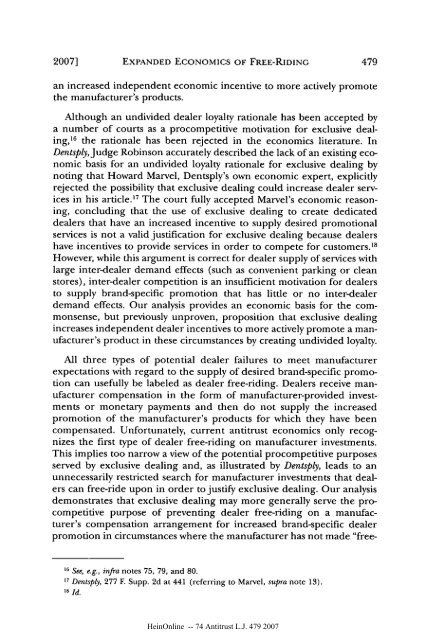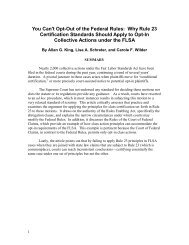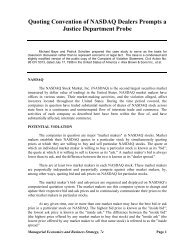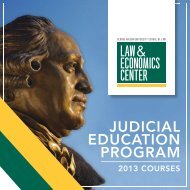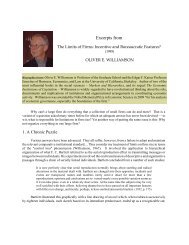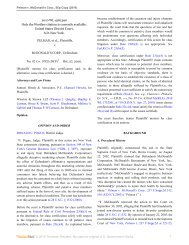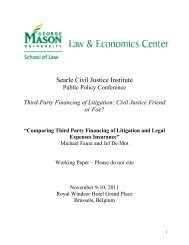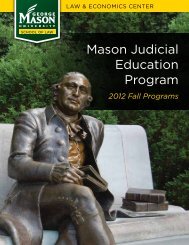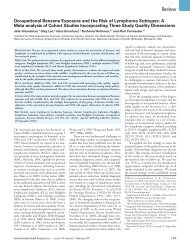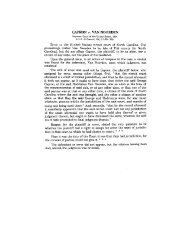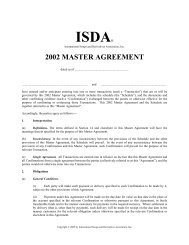Klein and Lerner, âThe Expanded Economics of Free-Riding: How ...
Klein and Lerner, âThe Expanded Economics of Free-Riding: How ...
Klein and Lerner, âThe Expanded Economics of Free-Riding: How ...
You also want an ePaper? Increase the reach of your titles
YUMPU automatically turns print PDFs into web optimized ePapers that Google loves.
2007]EXPANDED ECONOMICS OF FREE-RIDINGan increased independent economic incentive to more actively promotethe manufacturer's products.Although an undivided dealer loyalty rationale has been accepted bya number <strong>of</strong> courts as a procompetitive motivation for exclusive dealing,16 the rationale has been rejected in the economics literature. InDentsply,Judge Robinson accurately described the lack <strong>of</strong> an existing economicbasis for an undivided loyalty rationale for exclusive dealing bynoting that <strong>How</strong>ard Marvel, Dentsply's own economic expert, explicitlyrejected the possibility that exclusive dealing could increase dealer servicesin his article. 7 The court fully accepted Marvel's economic reasoning,concluding that the use <strong>of</strong> exclusive dealing to create dedicateddealers that have an increased incentive to supply desired promotionalservices is not a valid justification for exclusive dealing because dealershave incentives to provide services in order to compete for customers.' 8<strong>How</strong>ever, while this argument is correct for dealer supply <strong>of</strong> services withlarge inter-dealer dem<strong>and</strong> effects (such as convenient parking or cleanstores), inter-dealer competition is an insufficient motivation for dealersto supply br<strong>and</strong>-specific promotion that has little or no inter-dealerdem<strong>and</strong> effects. Our analysis provides an economic basis for the commonsense,but previously unproven, proposition that exclusive dealingincreases independent dealer incentives to more actively promote a manufacturer'sproduct in these circumstances by creating undivided loyalty.All three types <strong>of</strong> potential dealer failures to meet manufacturerexpectations with regard to the supply <strong>of</strong> desired br<strong>and</strong>-specific promotioncan usefully be labeled as dealer free-riding. Dealers receive manufacturercompensation in the form <strong>of</strong> manufacturer-provided investmentsor monetary payments <strong>and</strong> then do not supply the increasedpromotion <strong>of</strong> the manufacturer's products for which they have beencompensated. Unfortunately, current antitrust economics only recognizesthe first type <strong>of</strong> dealer free-riding on manufacturer investments.This implies too narrow a view <strong>of</strong> the potential procompetitive purposesserved by exclusive dealing <strong>and</strong>, as illustrated by Dentsply, leads to anunnecessarily restricted search for manufacturer investments that dealerscan free-ride upon in order to justify exclusive dealing. Our analysisdemonstrates that exclusive dealing may more generally serve the procompetitivepurpose <strong>of</strong> preventing dealer free-riding on a manufacturer'scompensation arrangement for increased br<strong>and</strong>-specific dealerpromotion in circumstances where the manufacturer has not made "free-16 See, e.g., infra notes 75, 79, <strong>and</strong> 80.'7 Dentsply, 277 F. Supp. 2d at 441 (referring to Marvel, supra note 13).18 Id.HeinOnline -- 74 Antitrust L.J. 479 2007


